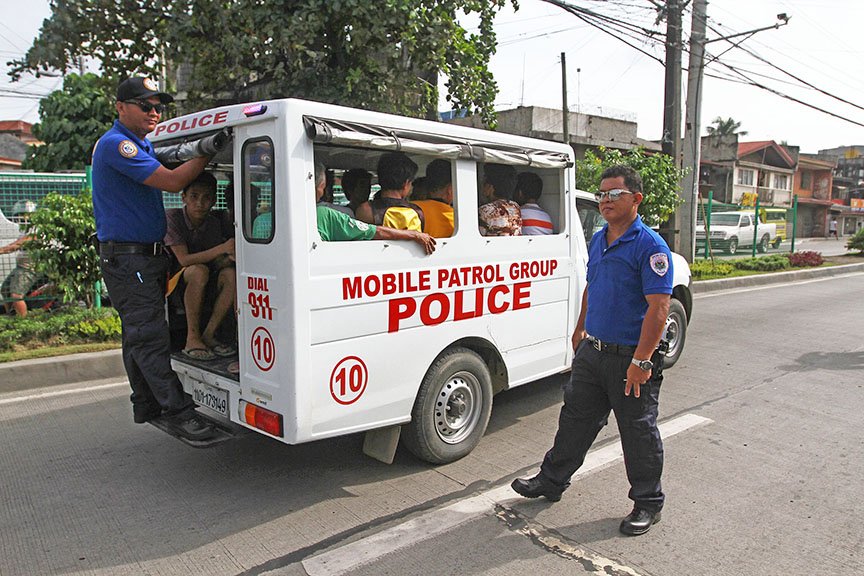 Local residents are hauled to the police headquarters during “Oplan Bolabog” at Isla Verde in Davao City on Thursday morning (25 May 2017). Mindanews photo
Local residents are hauled to the police headquarters during “Oplan Bolabog” at Isla Verde in Davao City on Thursday morning (25 May 2017). Mindanews photo
DAVAO CITY (MindaNews / 23 May) – Most Dabawenyos don’t trust the police when it comes to giving them subpoena powers, a survey conducted by the Institute of Popular Opinion (IPO) of the University of Mindanao said.
The survey asked 1,200 respondents in the city’s three districts from April 13 to 22 to measure the “sentiment of the people of Davao on granting of the said powers” to the Philippine National Police (PNP) chief, director and deputy director for administration of the Criminal Investigation and Detection Group (CIDG).
The survey said at least 48% of Dabawenyos don’t trust the police, 45% trust them, and 7% provided no response in terms of granting them such powers.
Republic Act 10973, which amended RA 6975 and signed by President Rodrigo R. Duterte on March 1 this year, grants the PNP chief and the two-highest ranking officials of the CIDG subpoena and subpoena duces tecum powers in relation to an investigation.
Subpoena is an order for a person to appear before a court or a body, while the subpoena duces tecum requires a person to produce a document or item, which may be vital to a case or investigation.
The survey found the findings interesting because the “public remains uncomfortable with the ability of the police, in this case, the PNP Chief and the two-highest ranking officers of the CIDG to remain worthy of the said powers” even if 64% of those who claim they have knowledge on granting of subpoena powers favored it.
The survey said 56% of Dabawenyos or 463,861 of individuals of legal age are aware of the law, 43% are unaware, and only 1% gave no response.
“It may seem that the full trust on the quasi-judicial ability given to the police force comes in a complicated context in addition to its law enforcement function. Combining the ‘no response’ and those who do not trust the police in the exercise of the subpoena power, an estimated number of 880,000 Dabawenyos express discomfort of the situation when police will have investigation and quasi-judicial powers,” it added.
It also found that least trust is evident among residents of the 1st District compared to those in the 2nd and 3rd Districts.
The survey added males are more trusting compared to females and members of the LGBT community.
It noted, however, that older Dabawenyos manifest trust in the police’s ability to exercise the new power without abuse, but the young and the young adults are doubtful of such ability.
“Income Class AB are least trusting, yet Income Class CD show higher confidence,” it said.
It said that compared to female and LGBT respondents, more males (51%) in the city believe that subpoena powers would be used against the poor in an abusive way.
“Interestingly, most of the middle-aged (54%) believe that the subpoena will be used against the poor, while 42% of those aged 18 to 30 believe that the poor and helpless will be targeted,” it said.
“Thus it seems that the older members of the society (except the senior citizens) are thinking that the subpoena will be a tool against the poor. Moreover, half of the income Class E believe that the poor will be targets also, while a small share of well-off, income class B believe that the subpoena will be used against the poor,” it added. (Antonio L. Colina IV/MindaNews)
